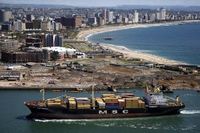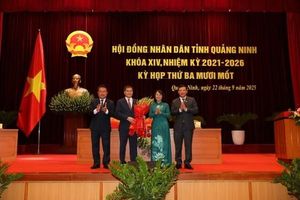As tensions rise between the United States and South Africa, Pretoria is taking proactive steps to safeguard its trade relations and bolster its diplomatic presence in Washington. Following the recent expulsion of South Africa’s ambassador, the government is preparing a bilateral trade agreement to mitigate the potential loss of access to preferential trade agreements, specifically under the African Growth and Opportunity Act (AGOA).
Deputy Trade Minister Andrew Whitfield announced that the South African government is actively working to secure continued preferential access to US markets while also preparing a backup plan should AGOA be revoked. This comes on the heels of a South African business delegation's visit to New York, where they engaged with representatives from approximately 600 US companies operating in South Africa. The discussions aimed to strategize on how to cope with the possible loss of duty-free access to US markets.
The relationship between the two nations has soured significantly due to a series of actions and statements from US President Donald Trump, who has expressed strong objections to South Africa’s stance on various issues, including its genocide case against Israel at the International Court of Justice and allegations of land seizures affecting white farmers. However, it is crucial to note that South Africa has not confiscated any land since the end of apartheid in 1994.
Despite the diplomatic fallout, the South African rand has shown surprising resilience, gaining 3.2% against the dollar thus far in 2025. Reezwana Sumad, a senior research analyst at Nedbank, remarked, "One would have expected the rand to have blown out already, given the diplomatic fallout between South Africa and the US, but it has been surprisingly stable." This stability is attributed to a broader trend among emerging market currencies, supported by a sharp dollar weakness.
However, Deutsche Bank has warned that any restrictions on US investments could trigger a significant financial shock for South Africa, which relies heavily on US capital to fund its current account deficit. Political analyst Ziyanda Stuurman highlighted the need for South Africa to strike a balance between addressing the criticisms from the Trump administration and maintaining its vital business relationships with US firms.
The chill in relations between Washington and Pretoria predates Trump’s return to power on January 20, 2025, as the US had already criticized South Africa’s neutral stance on Russia’s invasion of Ukraine. Since Trump’s inauguration, he has halted US aid to South Africa, and key US officials have snubbed G20 meetings hosted by the country.
In light of these tensions, South Africa is contemplating the appointment of a new ambassador to the US. Ebrahim Rasool was declared persona non grata by the US on March 14, 2025, prompting the South African government to consider a replacement. Among the potential candidates are deputy justice minister Andries Nel and former tourism minister Martinus van Schalkwyk.
Meanwhile, the Trump administration has nominated Leo Brent Bozell III, a conservative activist, to be the US ambassador to South Africa. The nomination has raised eyebrows given the current diplomatic atmosphere, and it remains unclear how this will impact the already strained relations.
On a related note, Elon Musk, a South African-born billionaire, has sought to expand his Starlink operations in South Africa but has expressed concerns over legislation aimed at increasing black participation in the economy. Musk has criticized the South African government, alleging that it enforces “openly racist ownership laws.” In response, Magwenya stated, "Elon Musk falsely believes that ‘white genocide’ is being perpetrated here in South Africa."
While the diplomatic landscape appears rocky, South Africa’s agricultural sector remains a beacon of resilience. Despite environmental challenges such as drought and animal health issues, agricultural exports reached a record US$13.7 billion in 2024, up 3% from the previous year. The sector’s top exports include citrus, grapes, maize, and wine, with the African continent accounting for 44% of total agricultural exports.
Trade with the US, however, represents only a small fraction—4%—of South Africa’s agricultural exports. If South Africa were to lose its AGOA status, it would face an average import duty of about 3%, which could significantly hinder its competitiveness in the US market. In 2024, South Africa’s agricultural imports totaled US$7.6 billion, reflecting an 8% increase year-on-year, primarily due to rising demand for products like wheat and palm oil.
As South Africa navigates these complex challenges, the government is urged to enhance logistical efficiency and explore new markets. Policymakers and agribusinesses are focusing on maintaining existing markets while seeking to expand into BRICS nations and other strategic regions. The collaborative effort between various government departments is crucial for sustaining and growing South Africa’s agricultural exports.
Ultimately, as the geopolitical landscape shifts, South Africa must adapt and strategize to protect its economic interests while fostering diplomatic relations. The coming months will be pivotal in determining the trajectory of US-South Africa relations and the implications for trade and investment.





